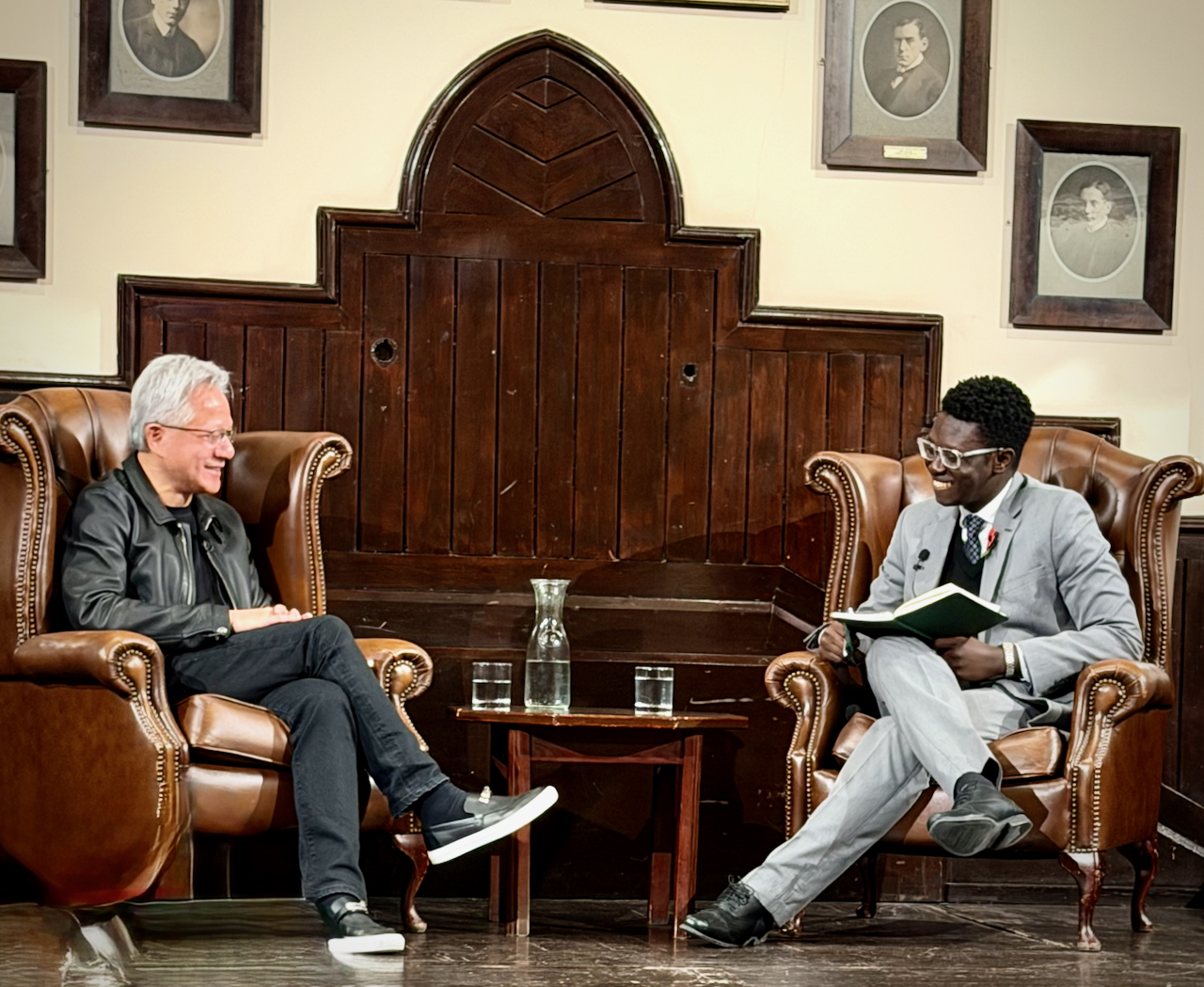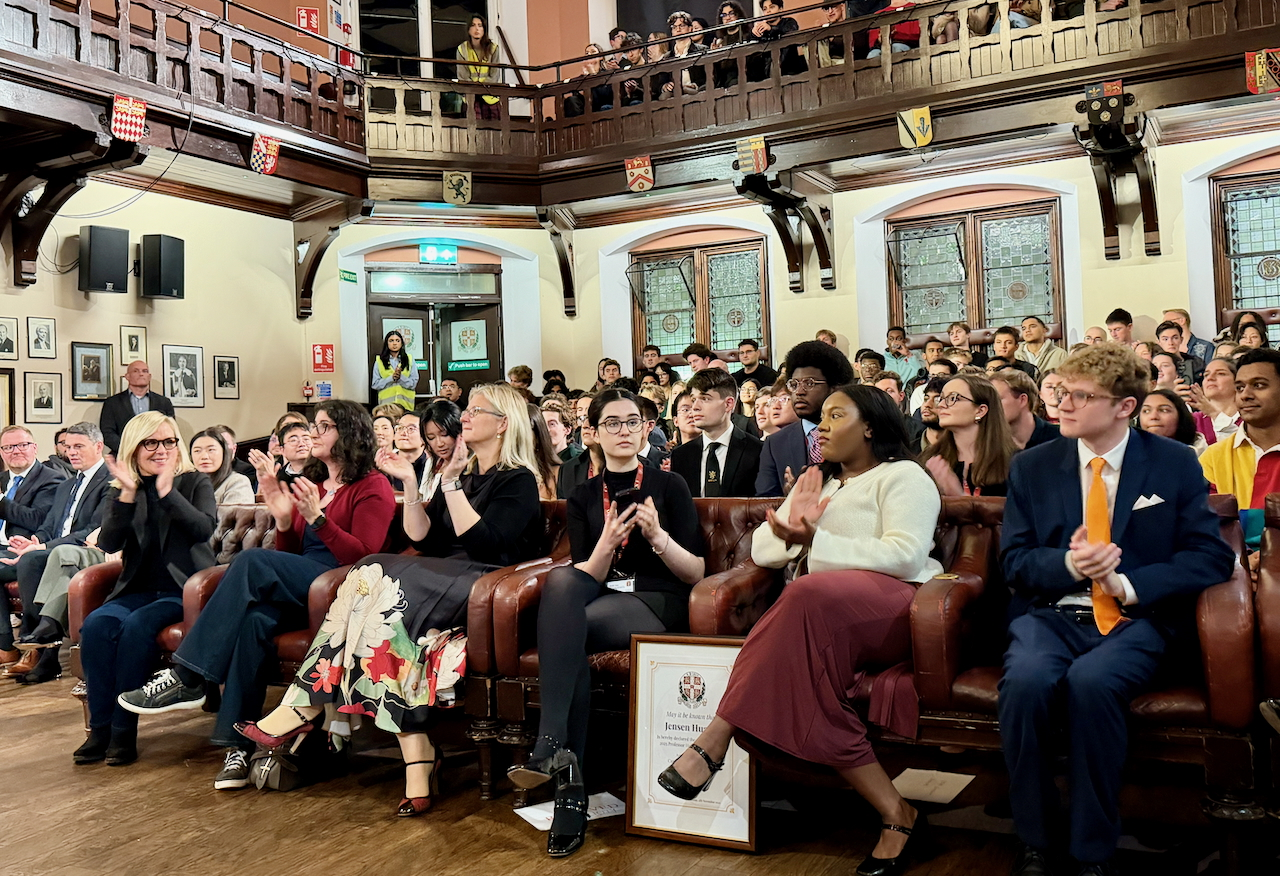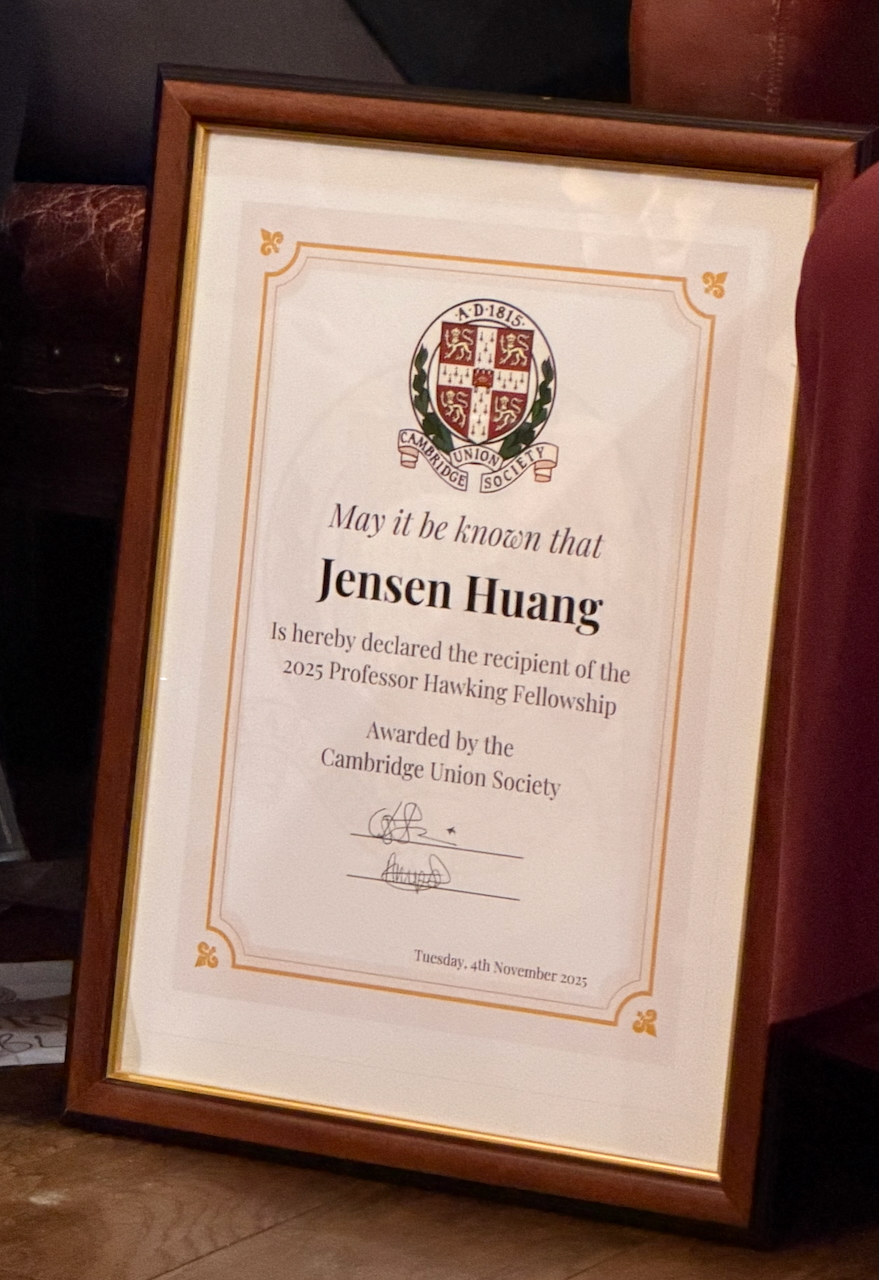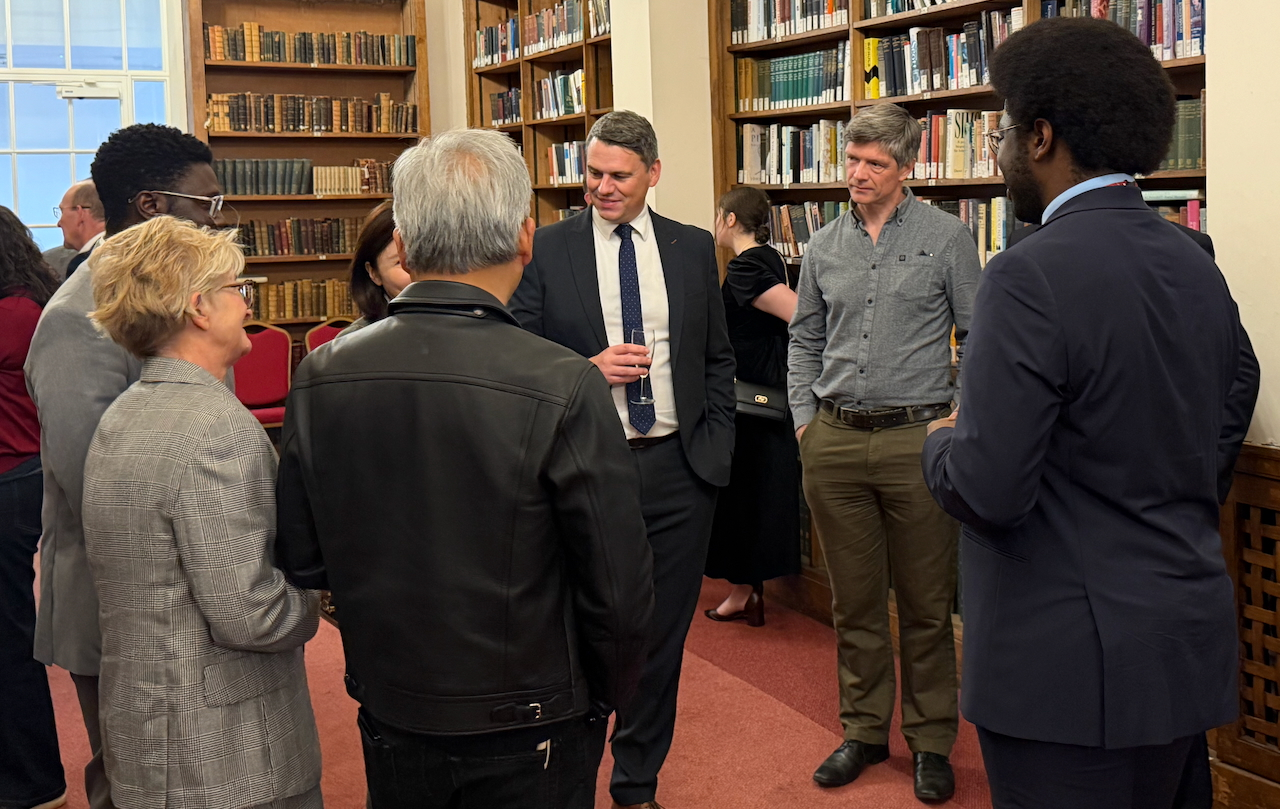I got to shake Jensen Huang's hand as he received the 2025 Hawking Fellowship this evening at the Cambridge Union! He's a fitting winner for this award; he's not only tech's longest running CEO (33 years!), but also a founding engineer who deeply understands the technology stack. He also bucks the trend among bigtech and famously doesn't believe in firing people, preferring to "torture them into greatness"[1] instead.
At the awards event this evening, Jensen made some remarks that stuck with me. He noted that he doesn't really like competing: "Nvidia is a company that succeeds when other companies succeed". By building platforms, Nvidia can focus on creating a better future that others aren't, and not on beating someone else. This mindset has had real adverse costs, but Nvidia has stoically taken hardware bets[2] that it believes in across six waves of computing generations.
It was quite delightful to hear this attitude of focussing on the future, and retaining a basic optimism and curious mindset even as his company becomes larger than most economies.
1 Did Jensen Huang just advise Cambridge to abolish exams?
My question to him was simple. My 816 year old institution has had exams as its staple assessment mechanism for centuries. Is AI finally the breaking point by which competitive stack ranking of brilliant students no longer makes sense? What would his advice to Cambridge University be now?

His answer was comprehensive and nuanced. At Nvidia, he's discounted 360 peer reviews or firing the bottom bracket of employees as ineffective. The reason for this is that those employees might be underperforming temporarily because they had the courage to take risks, and in the next cycle are a source of creativity to come up with fresh ideas and avoid ruts. If you weed out all the risktakers regularly, you've just weeded out a bunch of original thinkers! So instead, they focus on a culture of helping peers to improve, and trust individuals to avoid resting and vesting.
So how does this philosophy apply to Cambridge, a residential institution with a huge emphasis on high student contact time and full of mavericks? Jensen noted that the premise of testing students via exams is based around hiding some information (the exam) and making students find the answers (from their memory). When Google rose in popularity in the early 2000s, there was a lot of soul searching then about whether libraries were now obsolete. Today, AI makes finding expert information about specialist topics easier than ever, and makes it proportionately harder to use "information hiding" as the mechanism of assessment.[3]

So his view was that information hiding will become an ineffective form of scarcity, much like how digitising books made learning library skills far less of a useful discriminator. And instead, we could focus our pedagogical efforts on the qualities that will remain useful to our students throughout their careers and lives: the courage to be creative and take risks, the resilince to fail in a public setting, and the intellectual honesty to recognise when a direction needs to be altered.
I've been having long conversations with Carl Henrik Ek and Amanda Prorok about the values we really believe in for Computer Science at Pembroke, which are aligned with Jensen's remarks above. I don't think we'll be abolishing exams any time soon, but I wouldn't be suprised if their format dramatically changed by the end of this decade.
Nvidia is a remarkably agile company despite its huge size thanks to the culture that Jensen Huang established. Other large organisations with similar agility that I've worked with include Jane Street[4] and their famous lack of hierarchy. Cambridge also has a unique structure with the independent Colleges and University coalition that mean we resist centralisation, but exam culture is so deeply entrenched in our Tripos that seeing a quick path away from it might take some time -- but is possible!

2 He deeply believes in AI for scientific discovery
Another very encouraging aspect in Jensen's talk was his deep belief in the scientific method, and the important of intellectual honesty in our collective actions. He talked about his excitement about AI for drug discovery, but also how weird it is that we have to "discover" drugs in the first place. There are clearly physical laws governing the interactions betweeen biological entities, so why isn't biology more of an "engineering practise"?
His approach, of course, is the application of machine learning to build biological models. And with the advent of multimodal models, he'd like to be able to talk to proteins and interrogate them Socratically ("how would you bind to this other molecule?"). This chimes very well with the research we've been doing in my group for the past few years...
I've just been involved in two bold ARIA discovery grants that encourage us to ask exactly these sorts of big questions around understanding complex ecological systems using machine learning. The first is with Joe Millard on exploring the potential of combining distinct forms of foundational AI to simulate ecosystem resilience in digital space. The second is with Oisin Mac Aodha up in Edinburgh to think about species distribution prediction using a combination of machine learning, causal literature and remote observations.
Key to both of these succeedings are the foundational machine learning models we've been developing. The TESSERA geospatial model unlocks the modality of ground observation alongside conventional LLMs. The Cambridge TAP literature pipeline gives us deep causal connections from millions of experiments.
We haven't even begun to plumb the potential of combining some of these models in the future since we're deeply limited by our computational resources in the University at the moment. Luckily, both Nvidia and AMD[5] have been enthusiastic about supporting open research through GPU access, and we also have Dawn and soon Isembard. I'm really enjoying research life right now, and particularly so after seeing that someone as successful as Jensen Huang still retains a childlike curiosity about the world. Congratulations to him on a well-deserved Hawking Fellowship!

Some entertaining misc factoids from his talk:
- Nvidia almost had a huge UK presence, except that their purchase of ARM was blocked by regulators. Jensen made an offhand joke that "perhaps it wasn't too late to buy them"!
- He cited a great[6] marketing book I was given in 2001 on my first day at NetApp.
- He was the first generation of engineers that could use CAD to design a computer inside another computer. Today, every chip lives as a digital twin for ages before the real hardware comes back from a fab. This is pleasingly recursive.
- I finally met Lucy Hawking in person, who I've been wanting to meet for ages since I now own her childhood house (her dad is Stephen Hawking).
A big thank you to Andy Grant for the invitation to tonight's event! It was a lot fun.
-
Remarkably similar to a Cambridge University degree...
↩︎︎ -
The Geforce I bought back in 2001 came with expensive shader hardware that nothing supported. That feature lead to GPGPU programming that led to modern machine learning becoming computationally feasible.
↩︎︎ -
This is distinct from the problem of LLMs having a negative effect on learning in schools and university. I'm focussing on exams as the primary means of assessment.
↩︎︎ -
The Signals and Threads episode describing how Jane Street regularly swaps employee desks is a wild ride.
↩︎︎ -
AMD donated us access to enough MI300x machines to make the training of the first version of TESSERA possible earlier this summer.
↩︎︎ -
Possibly the only good marketing book I've read.
↩︎︎
